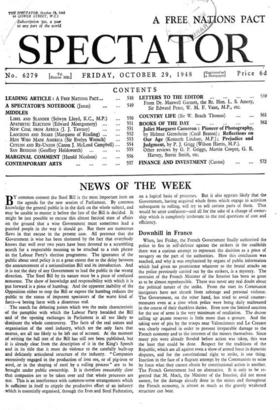NEWS OF THE WEEK
BY common consent the Steel Bill is the most important item on the agenda for the new session of Parliament. By common knowledge the general public is in the dark on the whole subject, and may be unable to master it before the fate of the Bill is decided. It might be just possible to excuse this almost farcical state of affairs on the ground that a wise Government must sometimes lead a puzzled people in the way it should go. But there are numerous flaws in that excuse in the present case. All pretence that the Government is wise has been shattered by the fact that everybody knows that well over two years have been devoted to a scrambling search for a respectable meaning to be attached to a rash phrase in the Labour Party's election programme. The ignorance of the public about steel policy is to a great extent due to the delay between the announcement of a nationalisation Bill and its introduction. And it is not the duty of any Government to lead the public in the wrong direction. The Steel Bill by its nature must be a piece of confused nonsense. The show of knowledge and responsibility with which it is put forward is a piece of humbug. And the apparent inability of the .Opposition either to stop the Bill or expose the humbug reduces the .public to the status of impotent spectators of the worst kind of farce—a boring farce with a disastrous end.
. The 'search for debating points which was the main characteristic of the pamphlet with which the Labour Party heralded the Bill 'and of the opening exchanges in Parliament is all too likely to rdoniinate the whole controversy. The facts of the real nature and organisation of the steel industry, which are the only facts that . matter, are all too likely to be left out of account. At the moment of writing the full text of the Bill has still not been published, but it is already clear from the description of it in the King's Speech and in its title that it must do violence to the carefully built-up and delicately articulated structure of the industry. "Companies extensively engaged in the production of iron ore, or of pig-iron or steel,, or in the shaping of steel by a rolling process" are to be
• brought under public ownership. It is therefore reasonably clear that companies are to be taken over and that whole processes are not. This is an interference with common-sense arrangements which Is sufficient in itself to cripple the productive effort of an industry • which is essentially organised, through the Iron and Steel Federation,
on a logical basis of processes. But it also appears likely that the Government, having acquired whole firms which engage in activities subsequent to rolling, will try to sell certain parts of them. That would be utter confusion—and all for the sake of a change of owner- ship which is completely irrelevant to the real questions of cost and efficiency.


































